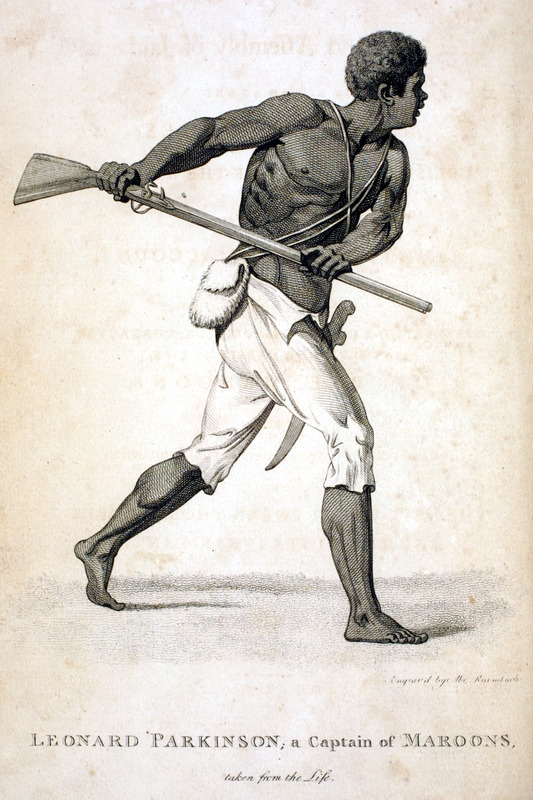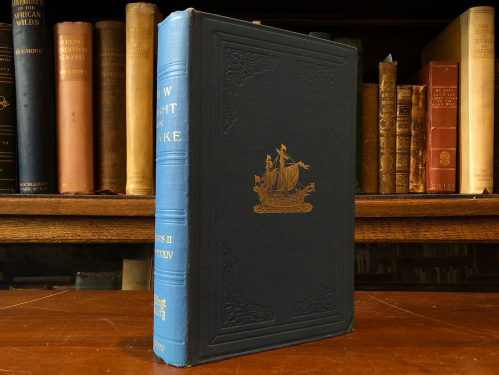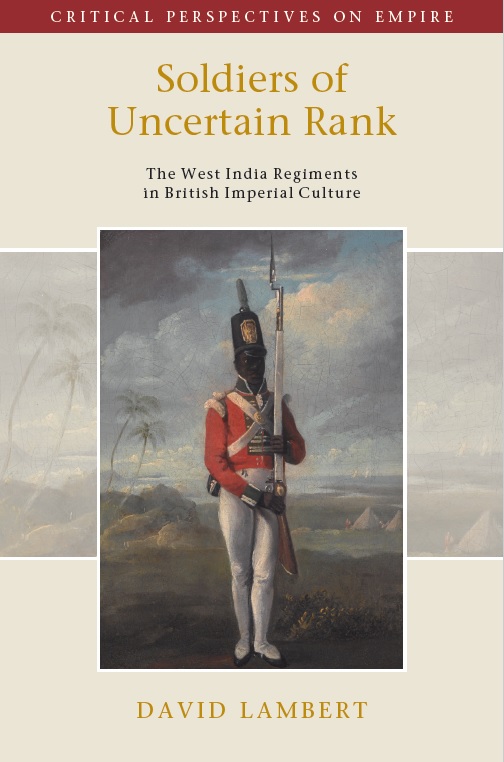Professor David Lambert
 |
Room:
Email:
Phone:
Office hours:
|
3.07, third floor, FAB
024 76523408 (internal ext. 23408)
Tuesday, 1.00-2.00
Wednesday, 10.00-11.00 |
Academic Profile
- Professor of Caribbean History, University of Warwick
- Director of the Centre for Arts Doctoral Research Excellence
- Midlands4Cities AHRC Doctoral Training Partnership Site Director
- Member of the History of Violence Network
- Member of Senate
External roles
- Associate Editor of Slavery & Abolition
- Fellow of the Royal Geographical Society
- Fellow of the Royal Historical Society
- Member of AHRC Peer Review College
- Trustee and Treasurer of the David Nicholls Memorial Trust
Teaching
- Freedom Fighting: Race, Slavery and War in the Revolutionary Caribbean, 1790-1812 (HI2H6-15)
- Historiography I (HI21E1) and II (HI21E2).
- Statues Must Fall? Remembering and Forgetting Slavery in the Atlantic World (HI3S8-30) - not running in 2022-23
- MA in Global and Comparative History
Research
My research is concerned with empire, race, warfare and slavery in the eighteenth and nineteenth centuries, focusing on the Caribbean and its place in the wider (British Atlantic) world. Working in cultural history, I draw on theories, methods and concepts from historical sociology, postcolonial studies and historical geography. In so doing, I seek to foster interdisciplinary dialogue around notions of centre/margin, the ‘transnational’ and ‘transimperial’.
Campaigning and Counter-insurgency in the Creole Archipelago
Developing from my research on the West India Regiments, I am now working on a new project on the representation and experience of warfare in the Revolutionary Caribbean, focusing on the 1793-94 (Grey/Jervis) and 1795-1796 (Abercromby/Christian) expeditions. The British fought not only against Republicanism but a multi-ethnic alliance of indigenous, enslaved, and free people inhabiting what Tessa Murphy (2022) terms the ‘creole archipelago’. Yet, Britain’s counter-revolutionary forces were also multi-ethnic in character, including other European soldiers and mercenaries of uncertain loyalty, as well as rangers and regulars of African descent. Drawing on the history of emotions and environmental history to develop a postcolonial approach to military history, this research is concerned with how the British struggled not merely to overcome their enemies, but even to comprehend the complex, revolutionary nature of the conflict. Using first-hand accounts, maps and material culture, it thus examines how British soldiers tried to make sense of, and survive in, the creole archipelago (Murphy, 2021).

Other previous research has consisted of four main projects:
Africa’s Sons Under Arms: Race, Military Bodies and the British West India Regiments in the Atlantic world, 1795-1914
‘Africa’s Sons Under Arms’ (ASUA) used Britain's West India Regiments to explore the relationships between the arming of people of African descent and the changing nature of racial thought from the late 18th to early 20th centuries. It comprised three interrelated components that examine WIR soldiers from different perspectives: as objects of medical scrutiny during their time in the Caribbean; as figures of public interest who served within the wider British army; and as participants in organised sport watched by local and visiting spectators. ASUA was a collaboration based on well-established relationships between the three main investigators (David Lambert, Tim Lockley and Beth Cooper) and the two partner research institutions (Warwick University and the British Library), and drawing on the scholarly and outreach expertise of both.
Knowledge, Exploration and Atlantic Slavery, c.1750-1850
This research project examined the relationship of colonial slavery to African exploration and cartography in the eighteenth and nineteenth centuries. It brings together histories of science and ideas with transnational histories of the Atlantic world and its enslaved ‘others’. My monograph Mastering the Niger: James MacQueen’s African Geography and the Struggle over Atlantic Slavery (University of Chicago Press, 2013) and a number of British Academy-funded papers have re-shaped understanding of pre-Victorian geographical thought, the politics of abolition and the origins of European colonialism in Africa.
Imperial Networks and ‘Imperial Careers’
This project has made significant theoretical and substantive contributions to the study of transnational histories by challenging the core/periphery binaries inherent in much imperial history, and elaborating a ‘networked’ alternative to investigate the discourses, practices and identities that circulated around empires. Moreover, I have propounded new approaches for exploring these networks by examining the ‘imperial careers’ of those involved in empire. The main output of this research was an edited collection of historical-geographical biographies entitled Colonial Lives across the British Empire: Imperial Careering in the Long Nineteenth Century (Cambridge University Press, 2006; edited with Alan Lester). This research is at the forefront of work at the nexus of biography, history and geography, and represents a critical contribution to imperial histories.
Transimperial Affiliations and Discourses of Whiteness
This pioneering research analysed relationships between metropolitan societies and the settler populations of their overseas empires to demonstrate how these were articulated through discourses of ‘Whiteness’. Far from an unproblematic marker of transimperial affiliation, I have shown White identities to be multiple and contested. This extends work in ‘Whiteness Studies’ – the field that examines the cultural aspects of people identified as ‘white’ – by moving beyond the US focus and instead considering British colonists in the Caribbean (c.1780-1840) and Gibraltar (c.1800-2000). The main output of this research was a monograph entitled White Creole Culture, Politics and Identity during the Age of Abolition (Cambridge University Press, 2005), which was nominated for the 2005 Young Academic Author of the Year Times Higher Education Supplement award. Revealing the uneven geographies of Whiteness, this research thus relocates debates to a transnational context.
Postgraduate Students, current and recently completed PhDs (full list here)
- Jane Lindon (2024-), 'Creolising Caribbean foodways: Breadfruit from the mid-nineteenth century to the present', AHRC-funded M4C Collaborative Doctoral Award; partner organisation: Royal Botanic Gardens, Kew
- Mackenzie Moffat (2024-), 'Medicinal Methods of Enslaved Resistance: The Role of Medicine in Practices of Enslaved Resistance in the Americas between the Seventeenth and Nineteenth Centuries', AHRC-funded M4C studentship
- Joshua Grey (2024-), 'The Right-Wing Press and the British World, 1780-1830', Monash/Warwick PhD Scholarship
- Catriona Sharples (2021-), 'Colonial science and military service: The West India Regiments and circum-Atlantic networks of knowledge, c.1815-c.1900', AHRC Collaborative Doctoral Award; partner organisations: Royal Geographical Society (with the Institute of British Geographers) and Royal Botanic Gardens, Kew
- Jim Hulbert (2021-), 'Before High Imperialism: Exploring the trans-imperial nature of British colonial violence in Australia, India and South Africa', AHRC-funded M4C studentship at University of Leicester
- Liz Egan (2019-2023), 'Constructing and challenging creole whiteness in Jamaica, 1865-1938', AHRC-funded M4C studentship
- Aleema Gray (2018-2023), 'Living in Babylon: An oral history of the Rastafarian movement in Britain, 1948-2016', Yesu Persaud Centre for Caribbean Studies/Warwick Collaborative Postgraduate Research Scholarship
Selected Publications (full list here)
-
‘The trials of Mary Prince’ in Nicole N. Aljoe (ed.), The Cambridge Companion to Mary Prince (Cambridge University Press, forthcoming)
- Soldiers of Uncertain Rank: The West India Regiments in British Imperial Culture (Cambridge University Press, forthcoming)
- Empire and Mobility in the Long Nineteenth Century (Manchester University Press, 2020), edited with Peter Merriman
- ‘“[A] mere cloak for their proud contempt and antipathy towards the African race": Imagining Britain’s West India Regiments in the Caribbean, 1795-1838’ Journal of Imperial and Commonwealth History 46: 4 (2018), pp. 627-650. doi: 10.1080/03086534.2018.1463612
- ‘Master-horse-slave: Mobility, race and power in the British West Indies, c.1780-1838’ Slavery and Abolition 36 (2015), pp. 618-641. doi:10.1080/0144039X.2015.1025487
News

16/7/24 - new PhD studentship available: 'Editing Empire: The Hakluyt Society in (Post-)imperial Britain, 1846 to the present' (October 2025 start)

29/2/2024 - new book forthcoming with Cambridge University Press.
